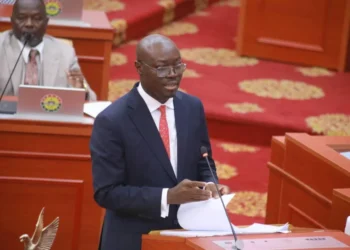Ken Ofori-Atta, the Finance Minister of Ghana has announced the reduction in the E-levy rate from the initial 1.75 per cent to 1.5 per cent.
The new reduction came after a delegation led by the Finance Minister met with the Minority leadership today, Friday January 28, as part of stakeholder engagements on the e-levy proposal.
However, the Minority led by its leader Haruna Iddrisu still opposed to it as they want the proposal to be dropped entirely. They also argued that the reduction is negligible.
The Majority Leader in Parliament, Osei Kyei Mensah Bonsu, thus urged all Members of Parliament to make it a priority to partake in the process leading to the passage of the E-levy.
Meanwhile, reports indicated that the government has now decided to table the E-Levy bill to the plenary later on today, Friday January 28, 2022 for a decision to be taken.
Though the E-Levy is not on the agenda of Parliament this week, the Majority explained that the move to have it taken on Friday is a result of Speaker Alban Bagbin’s decision to travel to the UAE for a medical review this weekend.
The Minority leader maintained his argument that the e-levy, when passed, will be disincentive to the growth of the digital economy.
“Mr Speaker, our concern is whether the e-levy itself is not and will not be a disincentive to the growth of digital economy in our country. We are convinced that the e-levy may as well be a disincentive to investment and a disincentive to private sector development in our country. We in the minority will not support government with the introduction of that particular e-levy.”
Haruna Iddrisu
Disaster if E-levy not Passed
Earlier on, Ken Ofori-Atta predicted economic disaster for Ghana if Parliament does not pass the Electronic Transfer Levy (E-levy). According to him, there are already some unfavourable signals from global ratings that need to be worked on to avoid consequences.
“If we don’t do this E-levy, we are just pushing ourselves in a way that would potentially end up in such a disaster. There was a warning because last week was a very difficult week for the country.
“Last week we got downgraded by Fitch because they do not believe we could raise the revenues that we had forecasted because we were fighting about E-levy. So we need to moderate that because the consequences are quick.”
Ken Ofori-Atta

Why E-levy
The Finance Minister announced a new levy to be charged by government in the 2022 budget on all electronic transactions to widen the tax net and rope in the informal sector.
“It is becoming clear there exists enormous potential to increase tax revenues by bringing into the tax bracket, transactions that could be best defined as being undertaken in the ‘informal economy’”
“After considerable deliberations, government has decided to place a levy on all electronic transactions to widen the tax net and rope in the informal sector. This shall be known as the ‘Electronic Transaction Levy or E-Levy’.”
Ken Ofori-Atta
He explained at the time that the new E-levy will be a 1.75 per cent charge on all electronic transactions covering mobile money payments, bank transfers, merchant payments and inward remittances to be borne by the sender except inward remittances, which will be borne by the recipient.
He added that a portion of the proceeds from the E-Levy will be used to support entrepreneurship, youth employment, cyber security, digital and road infrastructure among others.
READ ALSO: It’s Important To Keep Data Private- Emmanuel Gadasu























